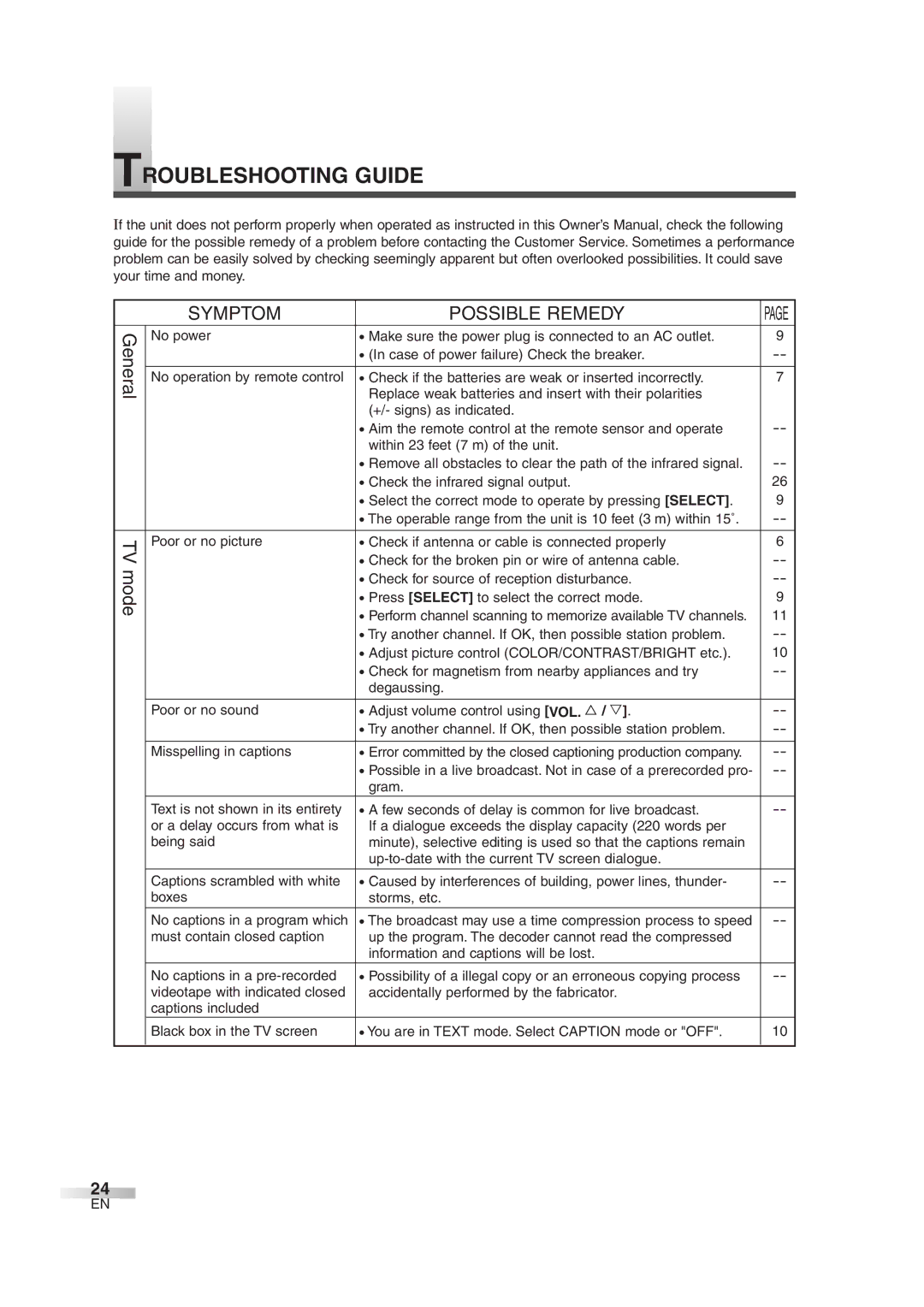
TROUBLESHOOTING GUIDE
If the unit does not perform properly when operated as instructed in this Owner’s Manual, check the following guide for the possible remedy of a problem before contacting the Customer Service. Sometimes a performance problem can be easily solved by checking seemingly apparent but often overlooked possibilities. It could save your time and money.
General
TV mode
SYMPTOM | POSSIBLE REMEDY | PAGE |
No power | • Make sure the power plug is connected to an AC outlet. | 9 |
| • (In case of power failure) Check the breaker. | |
|
|
|
No operation by remote control | • Check if the batteries are weak or inserted incorrectly. | 7 |
| Replace weak batteries and insert with their polarities |
|
| (+/- signs) as indicated. |
|
| • Aim the remote control at the remote sensor and operate | |
| within 23 feet (7 m) of the unit. |
|
| • Remove all obstacles to clear the path of the infrared signal. | |
| • Check the infrared signal output. | 26 |
| • Select the correct mode to operate by pressing [SELECT]. | 9 |
| • The operable range from the unit is 10 feet (3 m) within 15˚. | |
Poor or no picture | • Check if antenna or cable is connected properly | 6 |
| • Check for the broken pin or wire of antenna cable. | |
| • Check for source of reception disturbance. | |
| • Press [SELECT] to select the correct mode. | 9 |
| • Perform channel scanning to memorize available TV channels. | 11 |
| • Try another channel. If OK, then possible station problem. | |
| • Adjust picture control (COLOR/CONTRAST/BRIGHT etc.). | 10 |
| • Check for magnetism from nearby appliances and try | |
| degaussing. |
|
|
|
|
Poor or no sound | • Adjust volume control using [VOL. X / Y]. | |
| • Try another channel. If OK, then possible station problem. | |
|
|
|
Misspelling in captions | • Error committed by the closed captioning production company. | |
| • Possible in a live broadcast. Not in case of a prerecorded pro- | |
| gram. |
|
Text is not shown in its entirety | • A few seconds of delay is common for live broadcast. | |
or a delay occurs from what is | If a dialogue exceeds the display capacity (220 words per |
|
being said | minute), selective editing is used so that the captions remain |
|
|
| |
|
|
|
Captions scrambled with white | • Caused by interferences of building, power lines, thunder- | |
boxes | storms, etc. |
|
No captions in a program which | • The broadcast may use a time compression process to speed | |
must contain closed caption | up the program. The decoder cannot read the compressed |
|
| information and captions will be lost. |
|
No captions in a | • Possibility of a illegal copy or an erroneous copying process | |
videotape with indicated closed | accidentally performed by the fabricator. |
|
captions included |
|
|
Black box in the TV screen | • You are in TEXT mode. Select CAPTION mode or "OFF". | 10 |
|
|
|
24
EN
